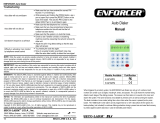
– 11 –
1*75 RELAY TIMEOUT YY SECONDS [000] | |
Enter the relay timeout, 0-127 seconds, desired for #80 Menu
Mode time driven event relay command numbers "05/10" and
#93 Menu Mode Relay Programming command "57".
1*76 ACCESS CONTROL RELAY FOR PART. [0] |
Relay will be pulsed for 2 seconds whenever code + [0] is
pressed. Enter 00-16; 00=none
3rd Page Programming Fields press *94)
2*00 NUMBER OF PARTITIONS [1]
Enter 1-8
2*01 DAYLIGHT SAVINGS TIME [04, 10] | |
START/END MONTH Start End
00-12; if no daylight savings time, enter 00,00
2*02 DAYLIGHT SAVINGS TIME [1, 5] |
START/END WEEKEND # Start | End
Enter 1-7. 1=first; 2=second; 3=third; 4=fourth; 5=last; 6=next
to last; 7=3rd from last [1,5; 1st Sunday in April, last in Oct.]
2*05 AUTO-ARM DELAY [15] |
Enter the time between the end of the arming window and the
start of auto-arming warning period, in values of 1-14 times 4
minutes 00=instant; [15=no auto arm at all]. When this delay
expires, the Auto-Arm Warrning Period begins.
2*06 AUTO-ARM WARNING PERIOD [00] |
This is the time during which the user is warned to exit the
premises prior to the auto-arming of the system (beeps every
15 seconds; "ALERT" displayed). Enter 01-15 minutes.
00=instant at end of arming delay .
2*07 AUTO-DISARM DELAY [15] |
This is the time between the end of the disarming window and
auto-disarming. Enter 01-14 times 4 minutes; 00=instant at
end of window; 15=no auto-disarm.
2*08 ENABLE FORCE ARM FOR AUTO-ARM [0]
0=disable; 1=enable
2*09 OPEN/CLOSE REPORTS BY EXCEPTION [0]
1=enable; 0=disable; If enabled, only openings and closings
occurring outside the scheduled opening /
closing windows will trigger dialer reports. Opening reports
will also be suppressed during the closing window.,
2*10 ALLOW DISARMING ONLY DURING [0]
ARMING/DISARMING WINDOWS
See system-wide field 2*11 if enabling field 2*10. This feature
adds high security to the installation.
0=disable; 1=enable
2*11 ALLOW DISARM OUTSIDE WINDOW [0]
IF ALARM OCCURS
Used only if field 2*10 (partition-specific field) is set to "1". If
this field is enabled ("1") the system can be disarmed outside
the disarm window if an alarm has occurred. If "0", disarming
can only be done during the disarm window. If field 2*10 is set
to "0" for a partition, this field has no effect for that partition.
SCHEDULING RELATED DIALER REPORTS
2*13 2*14
1st Digit 2nd Digit
|
| Early opening report code
|
| Early closing report code
|
| Late opening report code
|
| Late closing report code
|
| No opening (late to open) report code
|
| No closing (late to close) report code
|
| Auto-arm failure report code
|
| Access schedule changed report code
2*18 ENABLE GOTO FOR THIS PARTITION [0]
1=enable; 0=disable
2*19 USE PARTITION DESCRIPTORS [0]
0=disable; 1=enable
2*20 ENABLE J7 TRIGGERS by PARTITION [1]
0=disable for displayed partition; 1=enable for displayed
partition
2*21 ENABLE SUPERVISION PULSES FOR LRR
TRIGGER OUTPUTS [000] | |
Used for supervised connection to 7920SE. F B S
Enter 0 to disable or 1 to enable the listed outputs.
F= Fire; B= Burglary; S= Silent panic/duress
SUMMARY OF PROGRAMMING COMMANDS
• To enter program mode, enter installer code +
[8] + [0] + [0]
• To set standard defaults, press *97
• To set communication defaults, press *94 +
one of the following: *80=low speed; *81=Ademco
Express; *82=Ademco High Speed; *83=Ademco's
Contact ID
• To change to next page of program fields,
press *94
• To return to previous set of fields, press *99
• To erase account & phone number field
entries, press [*] + field number + [*]
• To assign zone descriptors, press #93 +
follow menu prompts
• To add custom words, press #93 + follow menu
prompts
• To enter Installer's Message, press #93 +
follow menu prompts
• To exit program mode, press *99 OR *98: *99
allows re-access to programming mode by installer
code. *98 prevents re-access to programming
mode by installer code.





















